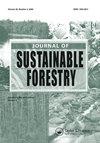制度多元治理:雷德背景下的研究与行动个案研究+
IF 1.8
4区 农林科学
Q3 FORESTRY
引用次数: 2
摘要
REDD+作为一种缓解机制,需要在矛盾的制度逻辑中参与各种行动者。突尼斯对联合国redd计划的承诺是减少温室气体排放的机会,也是确保可持续森林管理的机会,特别是因为突尼斯被认为是地中海地区最容易受到气候变化影响的国家之一。突尼斯大部分地区拥有干燥的森林,该国约10%的贫困人口依靠干燥的森林为生。考虑到REDD+的复杂性/混合性,本文的目的是从1)当地居民/利益相关者的挪用/参与,以及2)适应性的角度,探讨REDD+多元治理下共同创造社会价值的实践。基于近一年(2015年5月至2016年3月)的研究行动(RA),本研究的结果强调了REDD+适应性取决于通过集体学习过程进行的变革活动和参与批判性反思。我们的主要贡献是展示RA过程对REDD+多元治理概念化的兴趣,比如一个意义制定过程,通过提供基于翻译、谈判、积极参与和多参与者挪用的社会价值的共同创造者的新实践。本文章由计算机程序翻译,如有差异,请以英文原文为准。
Institutional Pluralistic Governance: A Case Study of A Research–Action in the Context of the Redd+
ABSTRACT REDD+ as a mitigation mechanism requires the engagement of various actors within a paradoxical institutional logic. Tunisia’s commitment to the UN-REDD Program represents an opportunity to reduce its GHG emissions, but also to ensure sustainable forest management, especially as the country is considered to be one of the most vulnerable to climate change in the Mediterranean. Tunisia mostly possesses dry forests, on which some 10% of the poor population in the country depends. Taking into account both the complexity/hybridity of REDD+, the purpose of this article is to explore co-creating social value practices in the case of REDD+ pluralistic governance from the point of view of 1) appropriation/engagement of the local population/stakeholders, and 2) adaptability. Based on a Research–Action (RA) for almost a year (from May 2015- to March 2016), the findings of this study highlight that REDD+ adaptability depends on the transformative activities and the engaging critical reflexive through a collective learning process. Our main contribution is to showcase the interest of the RA process in the conceptualization of REDD+ pluralistic governance such as a sense-making process, by offering new practices co-creators of social value, based on translation, negotiation, active engagement, and multi-actor appropriation.
求助全文
通过发布文献求助,成功后即可免费获取论文全文。
去求助
来源期刊

Journal of Sustainable Forestry
Social Sciences-Geography, Planning and Development
CiteScore
3.90
自引率
12.50%
发文量
42
期刊介绍:
Journal of Sustainable Forestry publishes peer-reviewed, original research on forest science. While the emphasis is on sustainable use of forest products and services, the journal covers a wide range of topics from the underlying biology and ecology of forests to the social, economic and policy aspects of forestry. Short communications and review papers that provide a clear theoretical, conceptual or methodological contribution to the existing literature are also included in the journal.
Common topics covered in the Journal of Sustainable Forestry include:
• Ecology, management, recreation, restoration and silvicultural systems of all forest types, including urban forests
• All aspects of forest biology, including ecophysiology, entomology, pathology, genetics, tree breeding, and biotechnology
• Wood properties, forest biomass, bioenergy, and carbon sequestration
• Simulation modeling, inventory, quantitative methods, and remote sensing
• Environmental pollution, fire and climate change impacts, and adaptation and mitigation in forests
• Forest engineering, economics, human dimensions, natural resource policy, and planning
Journal of Sustainable Forestry provides an international forum for dialogue between research scientists, forest managers, economists and policy and decision makers who share the common vision of the sustainable use of natural resources.
 求助内容:
求助内容: 应助结果提醒方式:
应助结果提醒方式:


